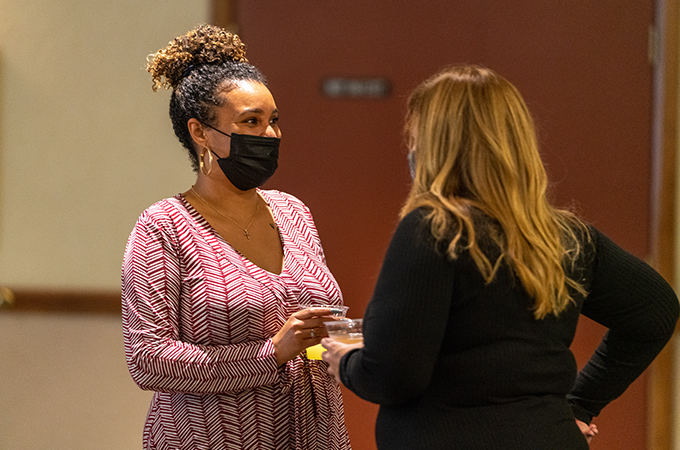On November 10, members of the University community gathered for the grand opening of the Conflict Resolution Center, whose mission is to support students, faculty, and staff members in successfully navigating conflict.
“Conflict doesn’t always mean a policy violation, or that a law was broken,” said Office of Equity and Title IX Director Erica Moorer, noting that discord can arise from many different types of situations. “But it can mean a lot of tension in our communities. I’m excited to share with you this resource and the ability to have trained folks work with you. There’s no shame or judgment in asking for help in a conflict—to receive resources, support, and services, to be able to move forward.”
During the event, members of the Center’s Steering Committee spoke about the resources available to the University community, the Center’s website, and the process of submitting a request to work with one of the Center’s team members.
For the past three years, Moorer and her team have collaborated with the Community Standards and Wellbeing Office in Student Affairs to bring the Center into existence. A group of 21 trained facilitators from offices and departments across the University will implement restorative justice practices and alternative resolutions to conflicts that arise.
The restorative justice approach emphasizes the repairing of harm, healing of trauma, reconciliation of interpersonal conflict, and reintegration of people who have been marginalized through participatory learning and improved decision-making skills. Rather than focusing on what policies have been violated, restorative justice processes instead identify those who have been harmed and the actions necessary to repair the harm.

While speaking about the resources available to students, Associate Dean of Community Standards and Wellbeing Jared Rodrigues explained what this philosophy looks like in the context of the U of R. Instead of maintaining a mindset of equivalent retaliation—where someone responds with further harmful actions in response to harm—the Center aims to broaden the scope of action.
“There are responses that are not about punishment and power over someone,” he said, remarking that conflict resolution is a philosophy and a state of consciousness. “It is also a set of analytical and interpersonal skills that folks can equip themselves with. That is, to me, the big-picture dream of the Conflict Resolution Center—this idea that, through this kind of work together, we can transform the relationships within our institution and equip our students with a new way of seeing and being in the world in order to transform it.”
Conflict doesn’t just happen between students. With faculty and staff members in mind, School of Education Professor Anne Blankenship-Knox and Director of Employee Relations Kady Wood ’06, ’10 outlined a number of books, activities, videos, and other educational resources that offer insights into the navigation of conflict, power dynamics, and the feedback process.
In addition to resolving on-campus conflict, University community members are also encouraged to join community-based groups that work to implement restorative justice practices in the Inland Empire. Senior Diversity and Inclusion Officer Christopher Jones listed a number of local groups as well as national organizations that provide different perspectives on understanding and conflict resolution.
“We hope these resources provide alternatives to our University community to allow the benefits of restorative justice, in all of its forms, to be a part of the work we will be doing, and part of achieving and providing a healthy and healing community for us at the University of Redlands,” said Jones.
Learn more about the Conflict Resolution Center and sign up to attend upcoming workshops and events.






